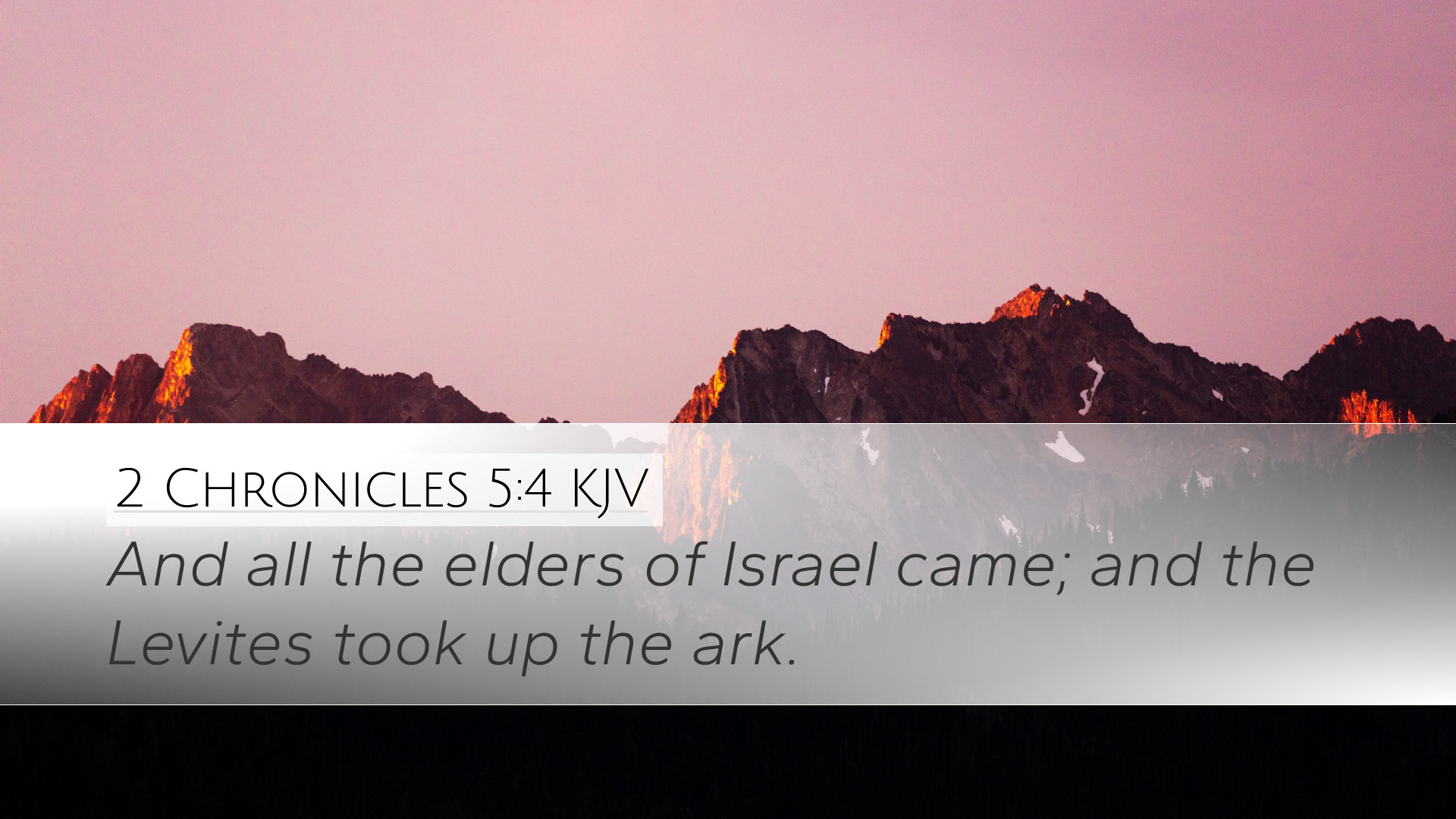Commentary on 2 Chronicles 5:4
This verse reads: "And all the elders of Israel came; and the Levites took up the ark." It marks a pivotal moment during the dedication of the temple Solomon built in Jerusalem, reflecting the fulfillment of God's promise and the collective worship of His people.
Contextual Analysis
In the broader context of 2 Chronicles 5, Solomon's temple inauguration is a significant event in Israel's history, symbolizing God's presence among His people. The gathering of the elders of Israel and the Levites is not just a ceremonial formality but a demonstration of unity and reverence.
Historical Insights
- The Unity of Leadership: As seen in commentaries by Matthew Henry, the presence of all the elders indicates the importance of national leadership in worship. The collaboration of leaders establishes a foundation for spiritual health in the community.
- The Role of the Levites: Adam Clarke emphasizes the integral role of Levites, tasked with transporting the ark, which signifies God's covenant with Israel. Their duty illustrates the seriousness and sanctity of handling sacred items.
Theological Implications
2 Chronicles 5:4 speaks to several theological reflections pertinent to pastors and theologians:
- God's Dwelling Among His People: The ark represented God's divine presence, a theme consistent throughout Scripture. This event connects to the New Testament understanding of God dwelling within believers (John 14:17).
- Corporate Worship: The gathering of leaders and community members highlights the significance of collective worship. It serves as an early model for the church's communal approach to glorifying God.
- Responsive Leadership: The elders' participation shows responsible leadership in spiritual matters, raising questions about the role of leaders today in guiding congregations toward reverent worship.
Lessons for Modern Believers
From this passage, several lessons emerge:
- Importance of Reverence: The Levites' careful handling of the ark reminds believers today to approach God with awe and respect, embodying the biblical principle of holiness.
- Community Engagement: Just as the elders gathered, believers are called to engage with their communities, promoting unity in faith and action.
- Commitment to God's Presence: The ark symbolizes a commitment to living under God's guidance, encouraging believers to seek God's presence in their lives.
Matthew Henry's Insights
Matthew Henry emphasizes the significance of this gathering at the temple, noting that it reflects the obedience and order established by King Solomon. He points out that all were present for this solemn occasion, indicating the importance placed on worship and the acknowledgment of God’s sovereignty.
Albert Barnes' Observations
Albert Barnes offers a reflection on the Levites' actions, highlighting the symbolic nature of the ark and the preparations made for it. He notes that this moment is characterized by reverence and solemnity, anticipating the glory of the Lord that would fill the temple, revealing the ultimate purpose of worship: to glorify God.
Adam Clarke's Commentary
Adam Clarke expands on the significance of the leadership role among the elders of Israel, discussing how their collective participation reflects a unified approach to divine service. He elaborates on the historical context, underscoring the importance of the ark as a representation of the covenant between God and Israel.
Conclusion
2 Chronicles 5:4 serves as a powerful reminder of the reverence, unity, and preparation necessary for worship in the presence of God. It challenges modern believers to consider the weight of their communal worship experiences and the responsibilities of leadership in guiding their congregations to honor God with their lives.


